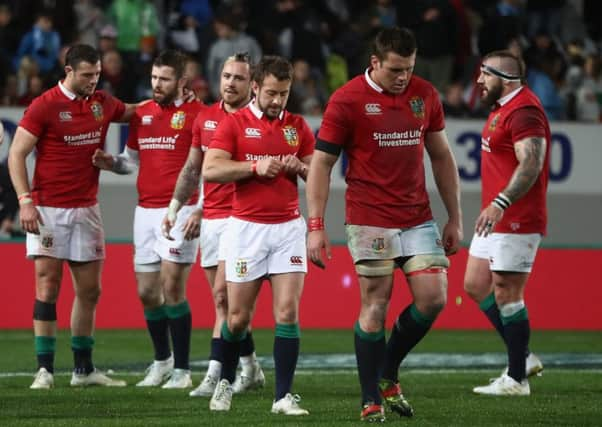Allan Massie: The Lions must find a way to play with flair


It’s simple. How should the Lions play? Stuart Barnes is a commentator who usually favours expansive attacking play, with lots of enterprise, risk-taking and off-loading, which indeed was how he used to play himself as stand-half for Bath and, occasionally, England. But here he was, after the Lions lost to the Blues, saying in effect that the Lions should forget about all that, and play a grinding game, relying on forward power, lots of driving mauls, and kicking to the corner. The Lions, he insisted, can’t match the All Blacks in a broken-field game. So they have to see that the field isn’t broken. He didn’t quite call for the return of Dean Richard and stuff-it-up-the-jumper rugby, but he came mighty close to doing so.
Well, he has a point in calling for the traditional English style – adherence to which usually kept him out of the England XV. The Lions backs were poor in both attack and defence in the first two games, running unimaginative lines and never threatening to open up the opposition defence. Maybe they’ll improve. I hope they do because, as I’ve written here before, I don’t see that there is a case for the continuance of the Lions if they don’t play with flair and style.
Advertisement
Hide AdAdvertisement
Hide AdWhat they mustn’t do is kick so poorly as to invite a counter-attack. Do that and the All Blacks will shred you. Nick Evans, the former New Zealand stand-off who has been the brains of his Harlequins team for ten years now, made that point this week. Carwyn James would have agreed: why kick and give hard-won ball back to your opponents, especially when you know that most times they will make good use of it.
Rhys Webb’s box-kicking was dreadful against the Blues, too long, rarely giving his wing any chance of regaining the ball. This sort of kicking is meat and drink to New Zealanders and the drink is champagne. If you have to kick it’s more sensible to put the ball in touch or at least near to the touchline, rather than down the middle of the field – that sort of kick offers too many opportunities to counter-attack.
Carwyn James again used to teach that your own 22 was often a good place from which to attack because you have a chance of surprising the opposition. So indeed you do, as the Scotland under-20 side showed against Ireland this week with a gorgeous try that started no more than ten yards from their own goal-line. Warren Gatland has usually been a coach averse to risk-taking, but without daring play you won’t beat the All Blacks. I repeat: they will score tries. So to beat them you must score more tries; 25 points is the minimum target.
Meanwhile, we can turn our eager attention to Singapore and Scotland’s match against Italy this afternoon. Given that the team shows nine changes from the one that beat Italy in the last match of the Six Nations we might reasonably feel apprehensive. At least that’s how it would usually have been in recent years.
It’s true we are without our three Lions and neither of the Brothers Gray is in the team. Nor are two more of our best players in the Six Nations, Huw Jones and Hamish Watson. On the other hand, Duncan Taylor, Willem Nel, Josh Strauss and John Hardie all return from time out injured, while Matt Scott has as keen an eye for the tryline as Jones whom he replaces.
You can’t say this is a significantly weaker team than the ones Vern Cotter was able to field in the Six Nations.
Italy’s coach, Conor O’Shea, has given his captain and outstanding player Sergio Parisse a well-deserved and much-needed summer off. Parisse has carried the Italian side so often and for so long that it appears weaker without him. This may not be the case. Parisse is such a great player and has been so dominating a figure that one has the impression that his team-mates have tended to rely excessively on him. In his absence they will have to take on more responsibility and may benefit from doing so.
Winning on a tour is never easy, but for this first match of Gregor Townsend’s first tour as coach, both sides are in the same position, away from home in unknown territory. An opening victory is essential for there are stiffer tests to come in Australia and Fiji.